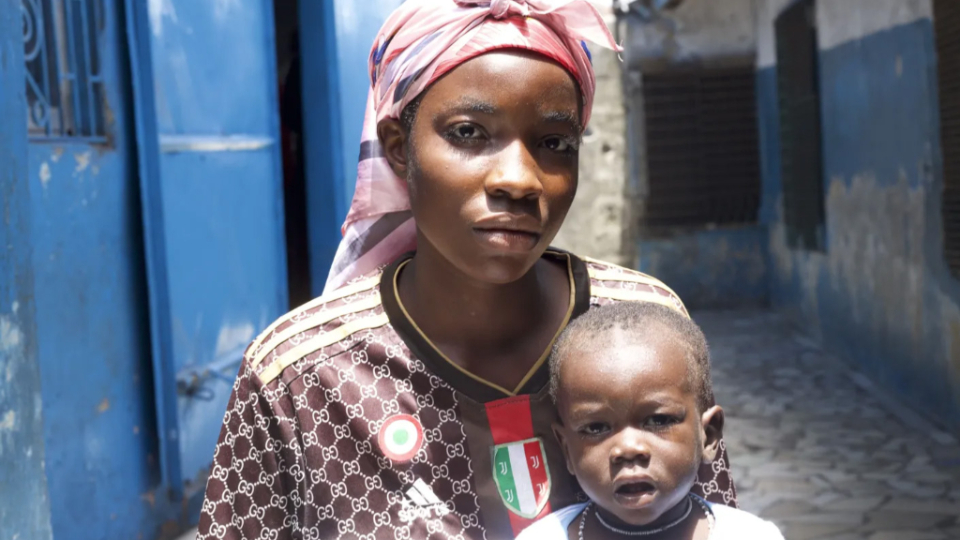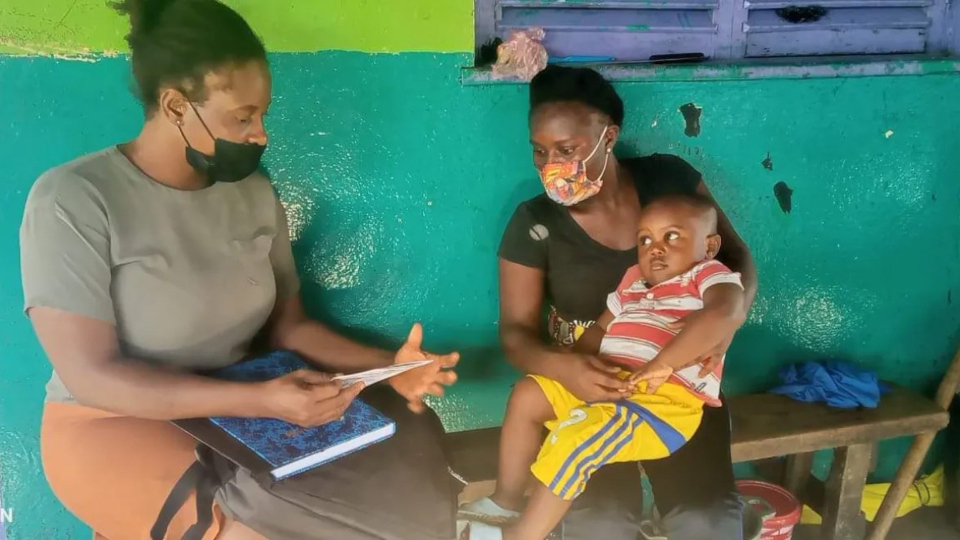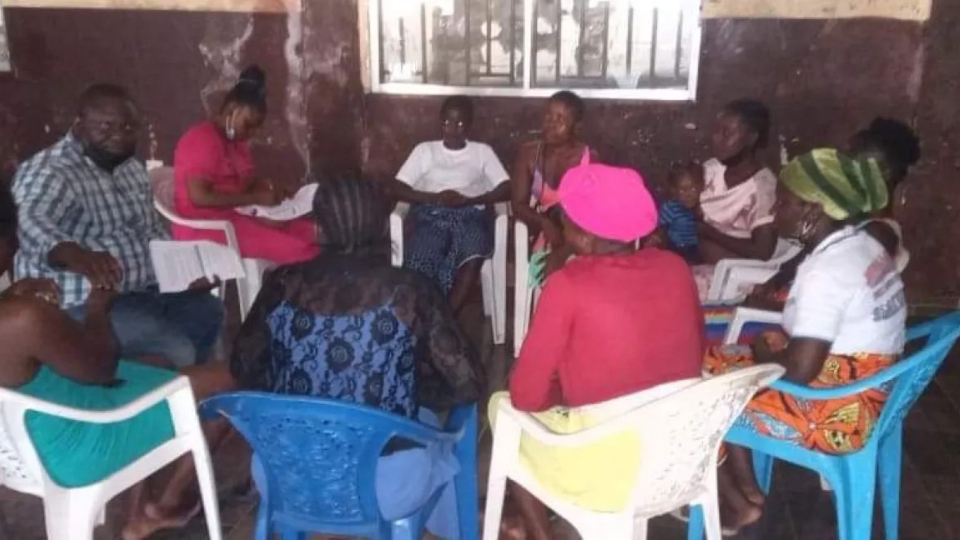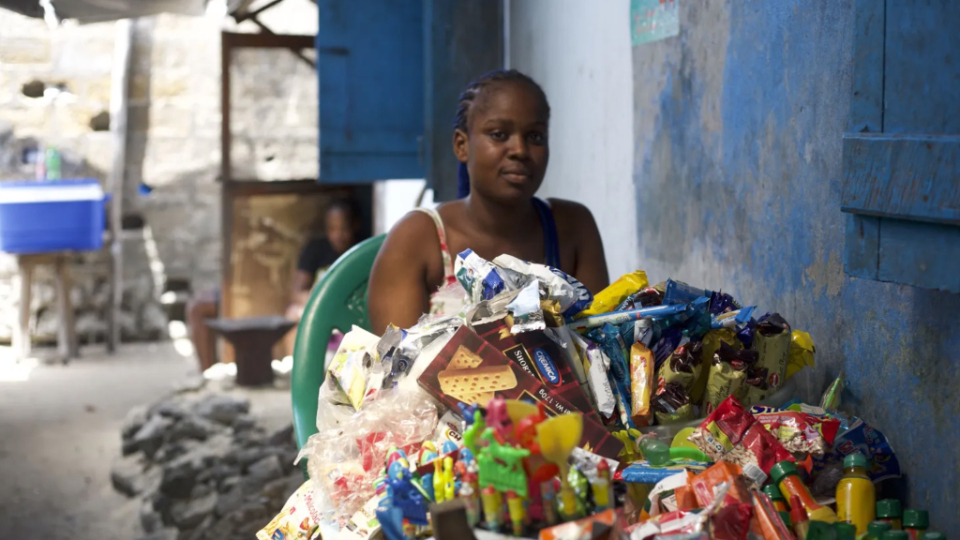
HELINA-Liberia1
Fatu Kanneh is pictured with her son in Monrovia, Liberia. Kanneh enrolled in the HELINA project, run by Catholic Relief Services, where she learned to improve her child’s nutrition and gained new business skills. Photo by Daron McDonnaugh, CRS Liberia, courtesy of Church News.All rights reserved.This story appears here courtesy of TheChurchNews.com. It is not for use by other media.
By Mary Richards, Church News
One out of every three children in Liberia is stunted due to inadequate diets, poor nutrition and poor sanitation practices.
Stunting is defined as low height for age, while wasting is defined as low weight for height. Both usually result from chronic or recurrent undernutrition, poverty or frequent illness.
Households led by women — especially young mothers — are more likely to be food insecure and face these nutritional problems.
Genevie Kutu Akoi, who lives in the West Point community of Monrovia, Liberia, had to leave school to start working when she became pregnant at age 20 and the child’s father moved away.
“When I gave birth to my son, things went really bad. I had no one to help me,” she said. “The small business I was doing broke down because I spent everything I had at that time.”
Fatu Kanneh, who also lives in the West Point community, became pregnant at 18 years old. The child’s father left, and her parents kicked her out of their house.
“The first two months after my delivery were very difficult for me. It was my first child, and I didn’t know what to do,” Kanneh said. “I really suffered; I don’t know how to explain it.”
But in January 2021, both young mothers were enrolled in a project called Healthy Living through Integrated Nutrition Activities (HELINA), implemented by Catholic Relief Services and funded by The Church of Jesus Christ of Latter-day Saints.

HELINA-Liberia2
A community health promoter meets with a mother and her child in their home for in-home counseling as part of the HELINA project in Monrovia, Liberia. Photo by Daron McDonnaugh, CRS Liberia, courtesy of Church News.All rights reserved.Each of the initial 570 HELINA participants received regular visits from a community health promoter trained by the country’s Ministry of Health. They also received in-home nutrition and hygiene counseling and learned best feeding practices. Their babies’ growth was monitored monthly at the local health facility.
Akoi said, “Had it not been for this project, how could I have known that I shouldn’t give my baby anything except breastmilk from 0 to 6 months old? Or the different kinds of soft foods to give my baby when he reaches 6 months?”
Improving Nutrition
Catholic Relief Services (CRS) began after World War II and has been in Liberia since 1957. Abena Amedormey, the country manager for CRS Liberia, said their nutrition programming is focused on reducing malnutrition, stunting and wasting among children.
If children have proper nutrition, they will be able to learn more in school, move through the educational system and eventually get to the point where they are employees or employable — thus breaking the poverty cycle.
“We look at it from that end line to make sure that we’re not just providing opportunities for nourishment for today but the impact it has in the future of an individual,” Amedormey explained to the Church News.
In 2013, 32% of children in Liberia had stunted growth. In 2020, that number was 30%. In 2013, 6% of children were classified as wasting, and that decreased to 3% in 2020.
“So you have this group of children that are not getting enough nourishment to be able to advance and live their full life,” Amedormey said. “Families can’t provide the nutrients needed for children to grow when those cells are forming in their very formative years, and so that’s where we came in with this project.”
Theophilus Davis leads the HELINA project. He said they chose the vast, densely populated community of West Point because of its challenges with poverty. Families cannot afford to feed their children much beyond perhaps one meal a day of rice and nothing else.
Year one of the project began in 2021 with 570 participants; now they are in year two.
“It’s not a one-time event,” Davis said. “We know that behavior change takes time. Participants received constant nutritional counseling, constant mentorship, constant food preparation demonstration, and those are things that they will be able to adapt and then make it part of their life.”

HELINA-Liberia3
Participants of the HELINA project meet in a family support group in Monrovia, Liberia. The project run by Catholic Relief Services has funding support from The Church of Jesus Christ of Latter-day Saints. Photo by Daron McDonnaugh, CRS Liberia, courtesy of Church News.All rights reserved.Mother support groups, family support groups and other interventions are helping link the participants with their family members and spouses so they get the support they need to be able to continue to provide for their children.
Referring the participants to the health facility ensures the children receive growth monitoring.
“Then the child can be measured on weight and height so that we know whether the child is improving in terms of health or the child is declining,” Davis said.
Working with the Ministry of Health and community health partners, Davis’s team is sharing with them the data, lessons learned and opportunities they see to further this effort.
Learning Business Skills
In phase two, the HELINA project is providing business skills training and seed funding to young mothers to start, expand or improve a business.
Amedormey said the people in Liberia are driven and want to be self-reliant. And by learning new skills, they will be able to manage their income, increase their profits and take care of their children’s nutritional needs.
Davis said that after going through the training program and receiving quality vocational skills training, participants will receive supplies and be connected with a mentor in their chosen field to continue to learn and improve.
Akoi and Kanneh were among the 100 HELINA project participants who received the training and funding. Akoi now sells snack foods to others in the community.
“After I received the money, I was able to restart my business, and now things are fine with me and my child. My business is growing little by little every day, and I know how to take good care of my child. I’m so happy,” she said.

HELINA-Liberia4
Genevie Kuto Akoi runs a small business selling snack foods in Monrovia, Liberia. She received training and seed funding through the HELINA project, run by Catholic Relief Services with support from The Church of Jesus Christ of Latter-day Saints. Photo by Daron McDonnaugh, CRS Liberia, courtesy of Church News.Copyright 2022 Deseret News Publishing Company.Kanneh started a small business selling vegetables and eggs and found a new room to rent for her and her child.
“My business is doing well. I’m making a profit from my daily sales. My son and I are able to eat daily and sleep well,” she said.
Thanks to the HELINA project, Kanneh sees a brighter and healthier future.
“I want to say thanks to CRS and the people who gave them funding to do this project here in West Point,” she said. “I learned plenty of things. Now I know how to take care of my baby and his health has improved daily.”
Copyright 2022 Deseret News Publishing Company.